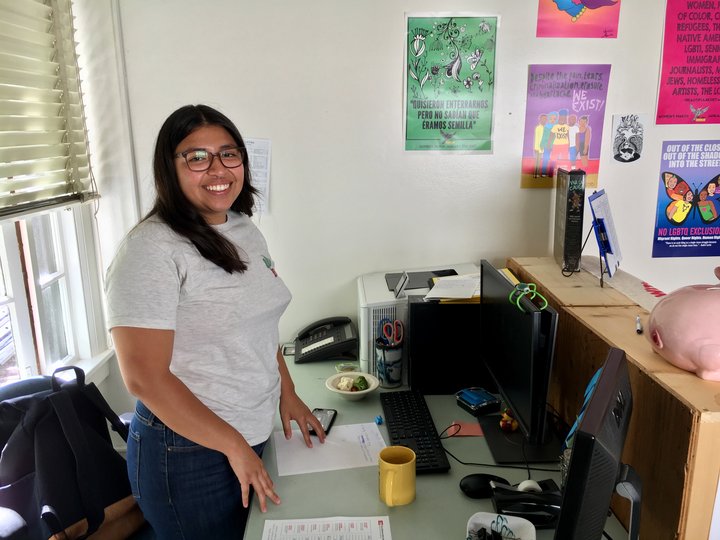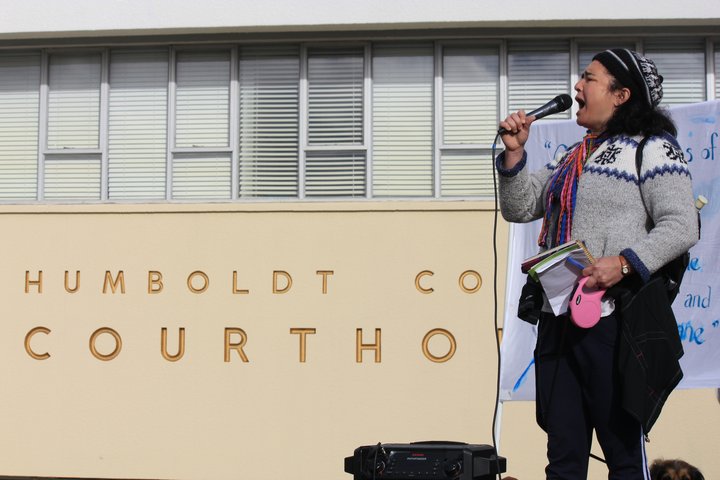Students at Humboldt State are praising the recent announcement of
legal services for undocumented students, with some saying it is a
much needed service that provides relief for the nearly 100
undocumented students at the university.
Anayeli Auza is a fifth-year student at HSU and the student coordinator for Scholars without Borders — an on-campus center that provides services and a safe space for undocumented students, as well as recipients of the Defered Action for Childhood Arrivials (DACA) and their allies.
Auza said the services are a relief for undocumented and “DACA-mented” students because it allows them to focus more on their studies and helps with the financial burden of renewing a DACA application. Auza herself is a DACA recipient who came to America from Mexico when she was only a year and a half old. She said the cost to renew a DACA application is $495 everything two years, and that doesn’t include attorney fees.

Anayeli Auza, student coordinator for Scholars without Borders, in the SWB office located in the Multicultural Center at HSU.
“Anything
that has to do with legal services can be very expensive, and as a
college student who doesn’t receive a lot of financial aid, that’s
an extra financial burden,” Auza said. “It’s not fair that
these students have to come to school constantly worried.”
Auza said undocumented students tend to take on more of a finanicial burden than their counterparts because of their inability to access federal student loans, Pell Grants and other forms of financial aid. Undocumented students in California qualify for in-state tution and are able to get grants from the state to attened higher education. But Auza said one of the main issues undocumented students face when attending universities is trying to find a place to live that is affordable. Without access to federal financial aid, this can be a problem.
“I was always very aware of my situation and was always going out of my way to find resources for myself,” Auza said. “But I know that not a lot of students are like that, not a lot of students know how to go out and find those resources for themselves.”
And that is where Scholars without Borders steps in to help. SWB first opened in 2017 have since helped around 300 students who are undocumented or DACA recipients, Auza said. She added that a handful of undocumented high school student have stopped by the center seeking help and guidance for how to plan for their future in education.
“We try to work with the community a lot because we know that there’s not a lot of resources for the undocumented community in Humboldt County,” Auza said. “And so just us being here, and being a part of this community, we’ve had to give back to the people who are going to be here after us students.”
Renee Saucedo, a volunteer organizer for Centro del Pueblo — a non-profit organization and one of the main driving forces behind Humboldt County’s Measure K — said Humboldt County in general is lacking in services offered to the Latinx population, and that given the growth of the Latinx population the lack of services is “unacceptable.”
She said there have been many instances where she has had to help somebody find an interpreter just to speak with a local attorney, and that responsibility for the lack of services falls on the shoulders of the community as well as elected officials.
“Just because we are a rural area should not mean we lack legal services,” Saucedo told the Outpost.

Renee Saucedo speaking at a Martin Luther King Jr. event on Jan. 21, 2019
Saucedo went on to say that many people in the Latinx population are undocumented or are from mixed-status families, which makes it hard for them to access healthcare. Back in July, California extended healthcare coverage to the undocumented community ages 25 and younger, thus providing coverage to about 138,000 people. Older undocumented residents have access to emergency services under MediCal, but have to pay out-of-pocket when it comes to standard doctor visits.
Saucedo called the legal services being offered to HSU students a “huge deal” because it allows them to chat with professionals and is a benefit to an underrepresented group.
“[HSU] has been recruiting Latinx students over the years and the university has to address their unique needs,” Saucedo said. “This is a step in the right direction.”
CLICK TO MANAGE